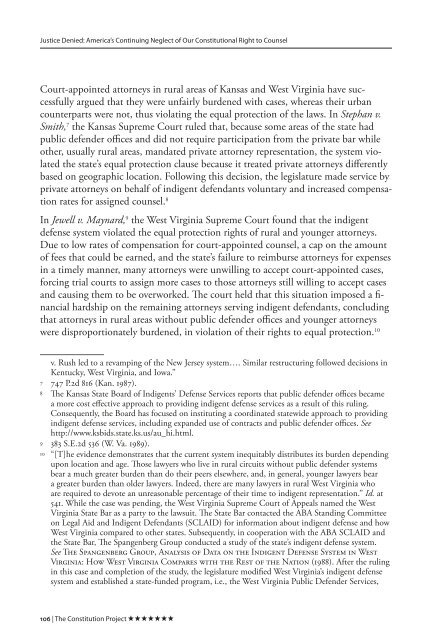Justice DenieD
Justice DenieD
Justice DenieD
You also want an ePaper? Increase the reach of your titles
YUMPU automatically turns print PDFs into web optimized ePapers that Google loves.
<strong>Justice</strong> Denied: America’s Continuing Neglect of Our Constitutional Right to Counsel<br />
Court-appointed attorneys in rural areas of Kansas and West Virginia have successfully<br />
argued that they were unfairly burdened with cases, whereas their urban<br />
counterparts were not, thus violating the equal protection of the laws. In Stephan v.<br />
Smith, 7 the Kansas Supreme Court ruled that, because some areas of the state had<br />
public defender offices and did not require participation from the private bar while<br />
other, usually rural areas, mandated private attorney representation, the system violated<br />
the state’s equal protection clause because it treated private attorneys differently<br />
based on geographic location. Following this decision, the legislature made service by<br />
private attorneys on behalf of indigent defendants voluntary and increased compensation<br />
rates for assigned counsel. 8<br />
In Jewell v. Maynard, 9 the West Virginia Supreme Court found that the indigent<br />
defense system violated the equal protection rights of rural and younger attorneys.<br />
Due to low rates of compensation for court-appointed counsel, a cap on the amount<br />
of fees that could be earned, and the state’s failure to reimburse attorneys for expenses<br />
in a timely manner, many attorneys were unwilling to accept court-appointed cases,<br />
forcing trial courts to assign more cases to those attorneys still willing to accept cases<br />
and causing them to be overworked. The court held that this situation imposed a financial<br />
hardship on the remaining attorneys serving indigent defendants, concluding<br />
that attorneys in rural areas without public defender offices and younger attorneys<br />
were disproportionately burdened, in violation of their rights to equal protection. 10<br />
v. Rush led to a revamping of the New Jersey system…. Similar restructuring followed decisions in<br />
Kentucky, West Virginia, and Iowa.”<br />
7 747 P.2d 816 (Kan. 1987).<br />
8 The Kansas State Board of Indigents’ Defense Services reports that public defender offices became<br />
a more cost effective approach to providing indigent defense services as a result of this ruling.<br />
Consequently, the Board has focused on instituting a coordinated statewide approach to providing<br />
indigent defense services, including expanded use of contracts and public defender offices. See<br />
http://www.ksbids.state.ks.us/au_hi.html.<br />
9 383 S.E.2d 536 (W. Va. 1989).<br />
10 “[T]he evidence demonstrates that the current system inequitably distributes its burden depending<br />
upon location and age. Those lawyers who live in rural circuits without public defender systems<br />
bear a much greater burden than do their peers elsewhere, and, in general, younger lawyers bear<br />
a greater burden than older lawyers. Indeed, there are many lawyers in rural West Virginia who<br />
are required to devote an unreasonable percentage of their time to indigent representation.” Id. at<br />
541. While the case was pending, the West Virginia Supreme Court of Appeals named the West<br />
Virginia State Bar as a party to the lawsuit. The State Bar contacted the ABA Standing Committee<br />
on Legal Aid and Indigent Defendants (SCLAID) for information about indigent defense and how<br />
West Virginia compared to other states. Subsequently, in cooperation with the ABA SCLAID and<br />
the State Bar, The Spangenberg Group conducted a study of the state’s indigent defense system.<br />
See The Spangenberg Group, Analysis of Data on the Indigent Defense System in West<br />
Virginia: How West Virginia Compares with the Rest of the Nation (1988). After the ruling<br />
in this case and completion of the study, the legislature modified West Virginia’s indigent defense<br />
system and established a state-funded program, i.e., the West Virginia Public Defender Services,<br />
106 | The Constitution Project


